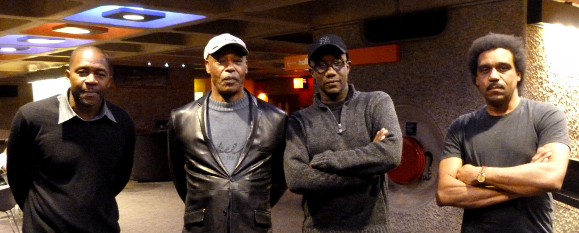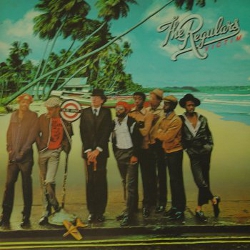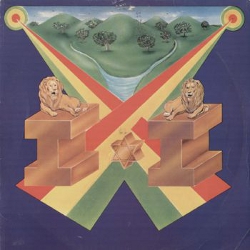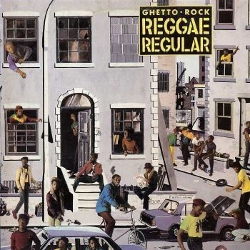Articles about reggae music, reviews, interviews, reports and more...
Interview: Reggae Regular (Part 1 - Their History)
- Home
- Articles
- Interviews
- Interview: Reggae Regular (Part 1 - Their History)

Interview: Reggae Regular (Part 1 - Their History)
"Castro Brown called us Reggae Regular. We called ourselves the Good, the Bad, and the Ugly!"
Sampler
Anyone who's heard a recent Greensleeves compilation will be familiar with the British band and harmony group who went by a bewildering variety of names in the late 70s and early 80s but today call themselves Reggae Regular. Formed in South London in 1976 the seven piece, comprising Alan King and Tony Rookwood (vocals), George 'Flee' Clarke (keyboards), Trevor Salmon (bass), Patrick Donegan (rhythm guitar), Norman Ebanks (lead guitar) and Errol Francis (drums) started getting attention for their live shows (sometimes backing the likes of the Morwells and 15-16-17).
A change of management from Castro Brown to Lloyd Patten resulted in a deal with Chris Cracknell at the newly founded Greensleeves and their first 12" Where Is Jah? credited to Reggae Regular (the name of a local live showcase) being released under the catalogue number GRED001 and hitting the Reggae top ten chart in February 1978. Their follow-up Black Star Liner hit number one and by the following year the group, taking the moniker The Regulars, were signed to CBS records. Their debut album 'Victim' mixed roots and lovers reggae with jazz fusion and soul styles but relations broke down during their European tour, with King, Rookwood, Clarke and Ebanks leaving to record what is popularly believed to be the sequel, the slower, deeply Rastafarian 'I & I' (1980). Meanwhile Donegan and Salmon recruited keyboardist Bryan Campbell and cut the single Jah Love for Greensleeves in 1981 as the Rebel Regulars creating their second longplayer (or third depending on where you stand!) 'Ghetto Rock' as Reggae Regular again in 1984 at the Mad Professor's Ariwa studio.
Unpicking such a complicated history is no easy task, but fortunately various members reformed in 2009, releasing a comeback album 'If Only' in October 2011. It features fresh material and recuts of old songs (including Black Star Liner in combination with Tippa Irie, who the group backed on his pop charting 1984 hit Hello Darling). George 'Flee' Clarke, Bryan Campbell, Patrick Donegan and new lead singer Patrick 'Dego' Johnson of the 1990s outfit Private Collection met Angus Taylor at London's Barbican centre to discuss their complex career. (As the history of the band is not well known we have chosen to edit this as little as possible).

Tell me about how the band originally formed in 1976-7.
George 'Flee' Clarke: The bass player then, Trevor and the drummer, and the singer, Alan, they were doing some original stuff, not reggae. I went down there to play some keyboards. In between in the breaks we used to play like Mighty Diamonds stuff, and Tony, the original vocalist, I just thought he was so good and I said he should do the vocals, they never liked it but that's how it went, he ended up doing the vocals and then from there we got Patrick. Patrick came in and that was it.
Which artists inspired the music of original line-up of the group?
George 'Flee' Clarke: Bob Marley. Bob, Bob, Bob, and more Bob. For me just Bob, but obviously it was Mighty Diamonds, Gregory, D Brown, Jacob Miller and Ken Boothe, don't forget him. To me it was all just about the material, if you haven't got the writing, if you're not going to produce something that's got substance, to me you're not going to get noticed or it's not going to last long, so that's where it was all at. So Bob was so influential.
You were managed by Castro Brown at first?
Patrick Donegan: Reggae-manage (laughs). For a short period of time.
George 'Flee' Clarke: Reggae-manage is in between fights (laughs).
He was working with Dennis Brown at the time. Did you meet him?
Patrick Donegan: Dennis was around when we were recording the original Black Star Liner, he was actually in the studio. He actually influenced the picking lead that was on the track because we didn't have a lead guitarist.
George 'Flee' Clarke: And the organ bob.
Patrick Donegan: He said "Just pick something!".
George 'Flee' Clarke: A super man, really super. He was just so talented, you wouldn't think he was so humble.
Patrick Donegan: He was a nice person. Very, very humble.
George 'Flee' Clarke: He wouldn't hear something nice that would go with a track and keep it to himself, he'd come and tell you, and almost insist that you put it in.
Patrick Donegan: And he didn't act like a superstar. Anywhere he's see you he'd just talk to you just like, you know? One of the nicest guys I've met in the business.
 Dennis Brown didn't act like a superstar
Dennis Brown didn't act like a superstar
Was it through Castro Brown that you played with 15,16,17?
George 'Flee' Clarke: We did some backing, we never actually got to play with them! (laughs)
Patrick Donegan: It was actually the first sort of outing of the band, wasn't it? Morwells and 15,16,17. Actually we weren't called Reggae Regular at the time, it was Castro that called us Reggae Regular.
George 'Flee' Clarke: (laughs) We called ourselves the Good, the Bad, and the Ugly. We were waiting to be introduced and they call "Ladies and Gentlemen, Reggae Regular!" (laughs)
Patrick Donegan: He didn't like the name, from in the rehearsal he used to say "You lot should change your name" and we'd said "No, we're not changing it".
A lot of people who like reggae these days outside of Britain don't seem to realise how the roots and the lovers rock were happening at the same time and very much connected rather than being very separate things.
George 'Flee' Clarke: Well, roots to me then was Rasta and lovers rock was like for softies. Lovers rock was a chance to really get hold of a girl and you know? But roots, say now, like the Bob thing now, people go out and whenever you play Bob Marley music everybody wants to dance now. Back then it wasn't the case so much, it was like at home with a spliff and listening, that's where it was.
Patrick Donegan: The two goes together because it was the people who were playing the roots who also played the lovers rock. No matter how big and bad and ugly you are you still like to have it with a girl, innit?
Tell me about how you met Chris Cracknell and the beginning of the relationship with Greensleeves.
George 'Flee' Clarke: We recorded Black Star Liner with Castro and then our manager then, Lloyd Patten decided we were going to record it properly and we went to Gooseberry down on Gerard Street and Dennis Bovell was the engineer. We recorded two tracks. Lloyd took it to Greensleeves who were just up and coming and they did a licensed deal, that was the thing then. They bought half-page ads in the Black Echoes and all that, so the chart would be favourable, do you know what I mean? If you didn't spend enough money on the advert the tracks would become number 11 but if you bought a half-page ad it could be number 4. But Where Is Jah was good enough track and Black Star Liner was good enough track, with the help of the half-page ads (laughs).
They're still being re-issued by Greensleeves on their compilations. Was your publishing shared at the time with the original group?
George 'Flee' Clarke: Yes, of course it was, we set up a publishing company for the whole band. You never got wages out of it because you were on the road, that's what you did for petrol, sometimes hotel bills and all that kind of business, you know, when you're on the road, before you got a deal and all that.
Did you have any rivalries with other British bands at the time?
Patrick Donegan: I think some of it was manufactured by management. There was supposed to be a rivalry between Steel Pulse and Reggae Regular but us and the guys were cool. We used to go to one another's dressing rooms and chat and stuff like that.
 There was supposed to be a rivalry between Steel Pulse and Reggae Regulars but us and the guys were cool
There was supposed to be a rivalry between Steel Pulse and Reggae Regulars but us and the guys were cool
Tell me a bit about how you got the link with CBS and recorded your first album.
George 'Flee' Clarke: It was a fad. All the major companies then wanted to sign a reggae band, all of them wanted a reggae band. Like when the ska bands were there, everyone wanted a ska band. It was that kind of way. Then the A&R people, they'd come to the gigs.
Patrick Donegan: Wasn't it Island that we were originally going to sign with? Island or Virgin.
George 'Flee' Clarke: But CBS was top of the tree then, so it was real prestigious to get a deal with them. That's what the management was working for.
At what point did you change your name to the Regulars?
 George 'Flee' Clarke: CBS did that. They thought "reggae" internationally was a big no-no, to them who don't know the reggae music. So, to be honest, we did agree with them at the time, so there's no point in me saying they were this and they were that, we agreed with them that it was a good move.
George 'Flee' Clarke: CBS did that. They thought "reggae" internationally was a big no-no, to them who don't know the reggae music. So, to be honest, we did agree with them at the time, so there's no point in me saying they were this and they were that, we agreed with them that it was a good move.
Now, that album has got a distinctive sound from your later albums. There's jazz and soul, it's what now people with hindsight would call a progressive roots sound.
Patrick Donegan: You're right.
George 'Flee' Clarke: It was, to me, initially just the songs. It's where the chord movements went and the melodies. Then the bass player was good and the drummer was good. If the drummer played a sound that we thought it wasn't good then he couldn't play it. I think the only person who could play anything that we didn't want was the bass player, Trevor Salmon.
Patrick Donegan: Yeah, he was a very progressive bass player. He wasn't really a reggae bass player. He used to study Stanley Clarke, so that's why the bass was so busy.
In those days reggae bands and non-reggae bands did a lot more touring together than happens now. Who were the most unlikely people you toured with?
Patrick Donegan: Boomtown Rats.
Patrick Donegan: Did a tour with them. Bit unusual, bit weird. Played to a lot of punk audiences.
George 'Flee' Clarke: Japan was another one. Siouxsie and the Banshees. Some guy that was down the Roundhouse, he looked like he lived there, I forgot what his name was. Glam rock, punk people, he was.
What was Bob Geldof like to tour with?
Patrick Donegan: Bob was all right!
George 'Flee' Clarke: He was nice. Down-to-earth. Really, really, really nice.
Patrick Donegan: We used to have a lot of chats. He used to come to our dressing room and stuff and we used to chat.
George 'Flee' Clarke: He did something one night which we never liked. They put pillowslips on and cut the eyes and come behind us when we were on stage, like Ku Klux Klan. We never knew, otherwise there'd be a little Bob Geldof walking about now! Believe me! But we never knew. In a way I feel like I'm glad we didn't know.
At this point it gets confusing. A lot of people think I & I, the next album that came out of your collective was a Regulars album yet it didn't have the Regulars name on the cover.
George 'Flee' Clarke: It was a faction. There was a faction of the Regulars.
Patrick Donegan: You had Regulars part 2 and you had I & I. So half of the guys went to Regulars part 2, which was what we did with Bryan Campbell and half went to I & I.
Patrick Donegan: Tony, Flee, and drummie. So half was I & I and half was Regulars.
Why was there a schism in the group?
Patrick Donegan: (laughs) That's a long story!
George 'Flee' Clarke: You have to get yourself a century man! God, we don't know what happened.
Patrick Donegan: It was a combination of management and persons being unhappy. Instead of getting together and sorting it out, factions developed in the band. So some people decided that they could work together with some people and they couldn't work together with other people. This is what happens with bands. We were on a European tour. One day certain members of the band decided that they wanted to go home. But it was crumbling anyway. The band was crumbling because of the things I mentioned before. Then in the middle of the tour half of the band wanted to go home, so half couldn't play by themselves.
So who made the I & I record and how did that come together?
 George 'Flee' Clarke: Well, the lead vocals from the original Regulars, Tony Rookwood, he was obviously a songwriter and he wrote some songs and that was it, there was me keyboards, we got Deuce Burke from Jamaica to play bass and Errol, the original drummer, played drums and Tony did the vocals and played guitar. The other singer Alan, lead vocals, did backup vocals. He wrote a song about Mrs Thatcher called Mrs Government and he said "You still sit proud in your pile of shit, um-hmm, doo-doo", which I thought was hilarious! (laughs). He's a funny, funny guy, talented writer, nice singer. He was there, definitely there but doing his songs within the I & I and Tony was doing his songs within the I & I.
George 'Flee' Clarke: Well, the lead vocals from the original Regulars, Tony Rookwood, he was obviously a songwriter and he wrote some songs and that was it, there was me keyboards, we got Deuce Burke from Jamaica to play bass and Errol, the original drummer, played drums and Tony did the vocals and played guitar. The other singer Alan, lead vocals, did backup vocals. He wrote a song about Mrs Thatcher called Mrs Government and he said "You still sit proud in your pile of shit, um-hmm, doo-doo", which I thought was hilarious! (laughs). He's a funny, funny guy, talented writer, nice singer. He was there, definitely there but doing his songs within the I & I and Tony was doing his songs within the I & I.
That I & I album seemed to be a slower, less of a progressive roots album. What influences came to bear on that?
George 'Flee' Clarke: Oh gosh. It was a very, very, very strong Rastafarian influence. Very, very strong.
Patrick Donegan: I think that you lot, maybe not you but those guys were moving into their Rastafarian phase.
George 'Flee' Clarke: Like Twelve Tribes of Israel.
Patrick Donegan: Reggae Regular wasn't a Rasta band but I & I was.
George 'Flee' Clarke: Definitely. I mean that's what the name says. But equally, apart from Born With Nothing and Armagideon Rock, to me it was like a Burning Spear thing, the vibrations.
So who was getting involved in the Twelve Tribes at the time?
George 'Flee' Clarke: Well, it was I & I, it was me, Tony Rookwood and Alan Kingpin, which looking back, it's like an indoctrination, but also a form of cultural education. A quick thing like the Twelve Tribes every month, say you were born in January you were a Zephaniah, and Joseph, which was Bob Marley and D Brown, they're called the Fruitful Bough, and you come down to Libras which is like the Tribe of Dan and they're in the Book of Judges, they're the Scales of Justice, and Libra's the seventh star from the sun, and he's the seventh son of Jacob, and so it was. Every month there were colours, so you had the silver for July and gold for August, so you have a dance and you have to wear something gold. I used to grin my teeth! (grins)
Can I just ask about that I & I album? Was that one of those old BBC sound effects records that was playing in between the tracks?
George 'Flee' Clarke: Absolutely! Spot on! Tony went off one day and came back (laughs). I never liked it! I did not like it one bit. I don't know what the hell it was supposed to be.
There were some sheep weren't there?
George 'Flee' Clarke: Yeah, yeah! (laughs) Baaaaaaaa! I remember that Born With Nothing, but yeah I don't know what! That kind of fad, I don't see what it's got to do [with the music]. I can see someone saying "Ladies and Gentlemen, please fasten your seat-belt, we're about to take off", I can see that but... there wasn't even a bloody lion on there...
Just some sheep and a fence falling down...
Patrick Donegan: I've never heard that!
George 'Flee' Clarke: And the sound of a Rasta pipe going (makes sucking noise) in the middle.
Bryan Campbell: I remember between there was machine gun fire. I remember that.
George 'Flee' Clarke: And that chillum pipe of ganja smoke. He just came back one day and I thought "Bloody hell, where'd this come from?"
Patrick 'Dego' Johnson: The BBC!
So Bryan, at what point did you join the other faction?
Bryan Campbell: I came onboard, was it '82?
Patrick Donegan: When the original Regulars broke up. Then what I'd call the Regulars Part Two came, which was Bryan, myself, Trevor the bass player, his brother was doing vocals, and Horseman on drums. Not the Jamaican artist Horseman, the English one. You had I & I and then there was me and the bass player who were like outcast. We lived in Battersea (laughs). Nobody would talk to us! So them that was there would play their music and they didn't invite us. They weren't using the name Reggae Regular so we thought "OK, let's form another Reggae Regular. Let's use the name." So me and Trevor got together, then we asked Bryan to join and his brother was doing lead vocals, and Horseman.
 We've been wailing for years and years and years
We've been wailing for years and years and years
So Bryan and Patrick your version of the band cut the Jah Love 12" as Rebel Regulars. Do you think that the various changes of name had any negative effect on marketing yourselves?
Patrick Donegan: Rebel Regulars came up because when we were recording with Greensleeves, I think there was a problem with the publishing issue with CBS because we were always signed to April Music, and we thought that we couldn't then go and record for Greensleeves because we were already signed with CBS. A lot of misunderstanding, so to be on the safe side we just called ourselves a different name.
Then you recorded your third album Ghetto Rock. Where did the link with the Mad Professor come from?
 Patrick Donegan: Because I used to engineer down there. That was recorded partly at Ariwa and partly at Easy Street.
Patrick Donegan: Because I used to engineer down there. That was recorded partly at Ariwa and partly at Easy Street.
Bryan Campbell: Mad Professor just recorded some of it.
Patrick Donegan: I did the engineering on it. We just used the studio basically.
On that album, again there was mention of Margaret Thatcher. At the time there seemed to be quite a drive to sing about social issues. Where did that come from? And is that something that the band is still involved in?
George 'Flee' Clarke: Yes. In one word: wailing. We've been wailing for years and years and years. You feel oppressed and trod upon, so that's always going to be there, but you find a different way now. If you're going to write a song about that now it's going to be written differently, it'll be more succinct rather than with a "kill the white people" kind of lyrics.
What was your reaction to the riots in the summer?
George 'Flee' Clarke: There's always going to be riots. I don't know what it is with Tory governments and riots. Every time they're in power there's a riot, and it doesn't seem to take much. Obviously I don't condone it but I can understand why. We can go back to the youth, they're a forgotten generation.
Bryan Campbell: Riots are kind of cyclical, they come along every few years. People get very oppressed, they get very frustrated, and that's how the masses vent their anger. It was like that, certainly for me, in the Notting Hill riot in '76.
George 'Flee' Clarke: You started it didn't you? (laughs)
Bryan Campbell: I was there and I saw it all develop and I can understand exactly why it developed. It was the whole thing back in the 70s with the SPG and the Stop and Search thing. I think Britain was just getting used to having black youth on the street and the police got it very wrong and I think Notting Hill riots was an explosion of frustration about the way black youth were being treated. I know reasons are a bit different in the last riots, it's more economics but it goes back to the whole social economic issues back then. It was a real struggle.
 Back in the 70s Britain was just getting used to having black youth on the street and the police got it very wrong
Back in the 70s Britain was just getting used to having black youth on the street and the police got it very wrong
Now that the Tories are in again as part of a coalition, what do you think of the current government?
Patrick Donegan: Me personally, I don't think about governments anymore (laughs). Politicians are politicians. To me a politician is a politician whether it's Labour or whether it's Tory. I think I've grown up now.
Bryan Campbell: Absolutely, absolutely. I think a lot of people think like that now. I vote for none of the above. We've seen it all.
Read more about this topic
Comments actually desactivated due to too much spams
Browse by categories
Recommended Articles
Latest articles
Recently addedView all
© 2007-2026 United Reggae. All Rights Reserved. Reproduction in whole or in part is prohibited. Read about copyright
Terms of use | About us | Contact us | Authors | Newsletter | A-Z














